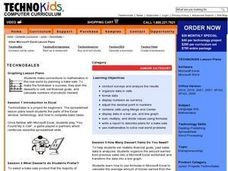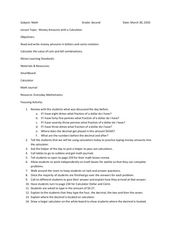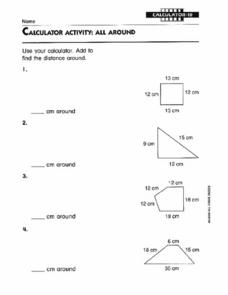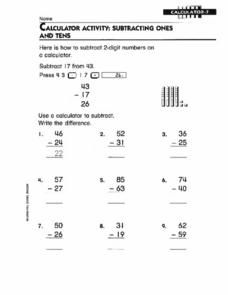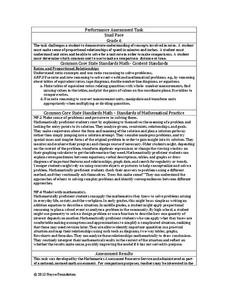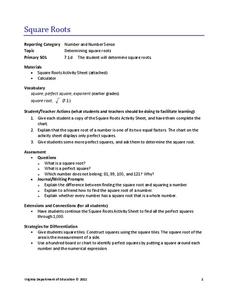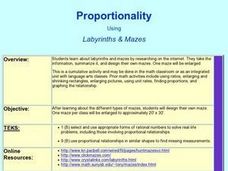Curated OER
Graphing Using Excel
Fifth graders complete a series of graphs by gathering information and using Excel to graph the information. For this graphing lesson, 5th graders graph favorite desserts of the class. Student put their results into the computer and...
Curated OER
Money Amounts With A Calculator
Second graders record money amounts with decimal notation. In this money lesson, 2nd graders read and construct monetary amounts using decimals. Students work with calculators and discover the rules of decimals.
Curated OER
Calculator Activity: Adding Ones and Tens
In this calculator activity, students read how to add 2-digit numbers on a calculator, then use a calculator to find 8 sums.
Curated OER
Calculator Activity: Word Puzzle
For this word puzzle worksheet, students use a calculator find the sums or differences for each number problem. Students then turn the calculator upside down to see a word from the number answer. Students write the word at the end of...
Curated OER
Calculator Activity: All Around
In this perimeter calculator worksheet, students use a calculator to help them find the distance around or the perimeter for each figure.
Curated OER
Calculator Activity: Subtracting Ones and Tens
In this calculator activity, students use this tool to learn to subtract two digit numbers. Students solve 9 subtraction problems on the calculator and write the differences.
Curated OER
Calculator Activity: Happy Trails
In this calculator activity activity, learners use a calculator to "follow trails" according to even or add numbers, then tell if the trail is odd or even.
Curated OER
The Louis Vuitton Project, using 3rd degree equations
Students model three-dimensional objects using cubes. In this geometry lesson, students calculate the volume and derived the amount mathematically. They use different objects to create two and three-dimensional objects.
Curated OER
Cylinder Volume Lesson Plan
Tenth graders define the formula for cylinders and use it to solve real world problems. In this geometry lesson, pupils differentiate between area, perimeters, 2D shapes, 3D shapes, and volume of prisms, cylinders and spheres. They...
Noyce Foundation
Snail Pace
Slow and steady wins the race? In the assessment task, scholars calculate the rates at which different snails travel in order to find the fastest snail. Hopefully, your class will move much more quickly in finishing the task!
Mathed Up!
Sine and Cosine Rules and Area of Triangles
Learners discover how to find missing sides and angles using trigonometry. Scholars first watch a video covering the Law of Sines and Cosines, as well as the area formula for a triangle. To test their knowledge, they complete a worksheet...
Virginia Department of Education
Transformation Investigation
Graph it! Investigate transformations with a graphing calculator. Pupils graph sets of linear functions on the same set of axes. They determine how changes in the equation of a linear function result in changes in the graph.
Shoreline Community College
Properties of Logarithmic Functions
Use a straightforward approach to understanding logarithmic properties and their role in solving exponential and logarithmic equations to your math class. The lesson begins with an overview of a logarithmic function and its connection to...
Virginia Department of Education
Square Roots
Square away any doubts about using a new resource. Pupils learn about squares and square roots in the mini-lesson. They complete a worksheet identifying roots of perfect squares up to 400.
EngageNY
End-of-Module Assessment Task: Grade 7 Mathematics Module 4
Asses the class to determine their knowledge of proportional relationships involving percents. Class members work through the nine-question assessment with a variety of percent problems. The multi-step problems involve simple interest,...
Beyond Benign
Ecological Footprint
How does your lifestyle measure up in terms of your ecological footprint? Young ecologists examine their impact on the planet using an insightful online calculator. A short quiz asks users to rank the size of their homes, their energy...
Curated OER
Math Activity File
Third graders describe the difference between area and volume and also explain how various units of measure relate to one another.
Houston Area Calculus Teachers
Collecting Driving Data
Give AP Calculus classes the opportunity to check the accuracy of their calculations! A calculus activity involves the collection of data, the application of mathematics, and the analysis of the accuracy of results. Young mathematicians...
College Board
2006 AP® Calculus AB Free-Response Questions Form B
An exam divides the six free-response questions into calculator use and no calculator use items. The non-calculator items are conceptual in nature and test whether pupils understand the calculus concepts. Scholars explain their answers...
EngageNY
Mid-Module Assessment Task: Grade 7 Module 2
A seven-question assessment determines how well your learners understand the procedures to add, subtract, multiply, and divide signed rational numbers. Pupils show their understanding through problem-solving situations.
101 Questions
Amazon Percent Discount
Everyone loves a good sale! A straightforward lesson provides practice with calculating a percent off of a product. Using ads from Amazon, individuals calculate the percent off the ad does not show. Pupils see the answer after revealing...
Curated OER
Proportionality Using Labyrinths and Mazes
Conduct research on the Internet about labyrinths and mazes to learn about proportions and ratios. Inquisitive minds design their own maze, one maze is chosen and proportionately enlarged to 20 feet by 30 feet. This is a fun challenge...
Illustrative Mathematics
Buying a Car
Teenagers love to think about driving and buying their first car. The intent of this resource is to create an equation for the list price of a car and add the appropriate state tax. Once your teens understand the calculation, ask them to...
Inside Mathematics
Marble Game
Pupils determine the theoretical probability of winning a game of marbles. Individuals compare the theoretical probability to experimental probability for the same game. They continue on to compare two different probability games.


